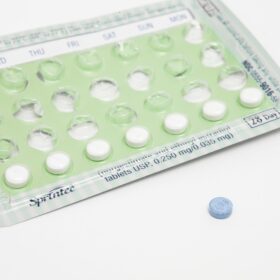
What is Gestodene?
In this article
What's the lowdown?
Gestodene is a strong type of synthetic progesterone
It as weak androgenic activity meaning it has lower chances of causing acne, weight gain and hair loss
This progesterone is an oral preparation and most commonly used in combination with an oestrogen
At times, it can also be used in hormone replacement therapy
Gestodene is a potent synthetic progesterone called progestogen. Gestodene is almost always used in the combined pill alongside synthetic oestrogens and is exclusively used orally.
Gestodene is thought to have no or weak androgenic activity, so it’s often recommended for use by people who prefer a less-androgenic contraceptive1. In some countries, it’s also used as a form of Hormone Replacement Therapy (HRT).
How does Gestodene work
Gestodene stops you from ovulating. When it’s used alongside ethinyl estradiol (a synthetic oestrogen) it also makes your cervical fluid too thick for sperm to pass through, and makes your uterine lining too thin for a fertilised egg to implant. All these essentially prevent a pregnancy from occuring.
What is it used in?
Combined pill
Is Gestodene androgenic?
Yes, but it is weak1. (Check out our ‘Androgens’ blog for more info on what this means).
Gestodene side effects
As gestodene is only used in combined contraceptives with ethinyl estradiol (synthetic oestrogen), it’s hard to say which of the reported side effects it is responsible for, and which are down to its fellow hormone. It is hard to know the specific gestodene side effects as it is not used alone. When use as an combined ethinylestradiol gestodene pill, the following side effects have been reported2 3:
- Breast tenderness or enlargement
- Mood changes
- Headaches
- Dizziness
- Changes to your period
- Changes to libido
- Increased vaginal discharge
As Gestodene is a third generation progestogen, it is thought to carry higher risk of a venous thromboembolism which is a blood clot.
As of September 2024, in the Lowdown Femodene users, 100% complained of dizziness, 100% lost their sex drive, 100% had a negative impact on mood, 50% had vaginal dryness and 50% experienced period-like cramps. In Kayta 30/75 users, 50% complained of dizziness, 50% lost their sex drive, 50% had a negative impact on mood, 50% had vaginal spotting and 50% had headaches. In Millinette 30/75 users, 62% experienced vaginal discharge, 50% lost their sex drive, 31% had a negative impact on mood, and 54% had lighter periods.
Desogestrel vs Gestodene
Desogestrel and Gestodene are both synthetic progesterones. They are both 99% effective in preventing pregnancy. Gestodene is not used alone in contraception, commonly found in the combined oral contraceptive (COCP) while desogestrel is used alone in progesterone-only pill (POP). Some studies have found that gestodene might provide better cycle control and less bleeding than desogestrel4.
Drospirenone vs Gestodene
Drospirenone can be used in both COCP and POP contraceptive preparations. Drospirenone is a synthetic progesterone, but works differently in both COCPs and POPs. When used in COCP is an ant-mineralocorticoid which reduces the amount of sodium reabsorbed by the kidneys and in POPs is has antigonadotropic properties which suppresses the luteinising hormone, preventing an ovarian follicle from growing. Drospirenone is a fourth-generation synthetic progestogen and has higher venous thromboembolism risks.
Our medical review process
This article has been medically reviewed for factual and up to date information by a Lowdown doctor.







